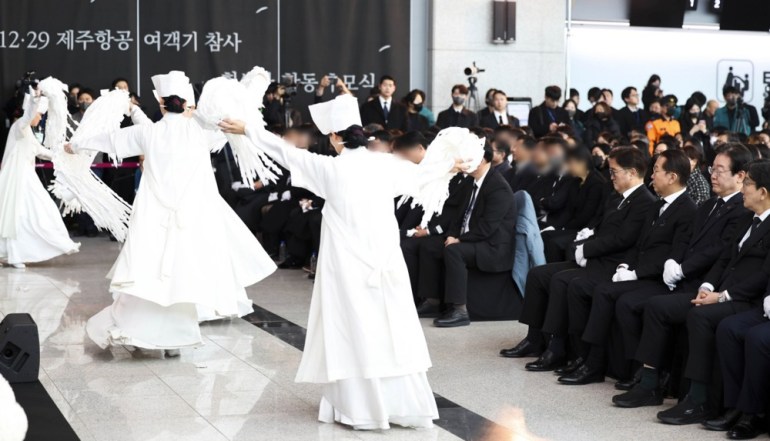Both engines of Boeing 737-800 jet that crashed in December killing 179 contained remains of Baikal teals, a migratory duck that flies to South Korea for winter.
The engines of a plane that crashed in South Korea last month contained bird remains, a preliminary investigation into the country’s worst aviation disaster has found.
The six-page report released on Monday by South Korean authorities said both engines of the Boeing 737-800 jet had DNA from Baikal Teals, a type of migratory duck that flies to South Korea for winter in huge flocks.
Bird bloodstains and feathers were “found on each” engine, it added.
However, the report provided no initial conclusions about what may have caused the Jeju Air plane to land without its landing gear deployed, and why flight data recorders stopped recording in the final four minutes of the flight.
A probe being conducted by South Korean and US investigators continues.
‘Group of birds’
The plane was flying from Thailand to Muan in South Korea on December 29 when it crash-landed and exploded into a fireball after slamming into a concrete barrier.
The disaster killed 179 of the 181 passengers and crew of the plane.
“The pilots identified a group of birds while approaching runway 01, and a security camera filmed HL8088 coming close to a group of birds during a go-around,” the report added, referring to the Jeju Air jet’s registration number.
After the air traffic control tower cleared the aircraft to land, it advised the pilots to exercise caution against potential bird strikes at 8:58am, the report said.

Just a minute later, both the voice and data recording systems stopped functioning, while the plane was already at an altitude of about 152 metres (500 feet) and just 2km (1.2 miles) from the runway.
Seconds after the recording systems failed, the pilots declared Mayday due to a bird strike and attempted a belly landing.
The plane exploded in flames when it collided with a concrete embankment during its landing, prompting questions about why that type of barricade was in place at the end of the runway.
Last week, authorities said they would replace such concrete barriers at airports nationwide with “breakable structures”.
The captain had more than 6,800 flight hours, while the first officer had 1,650 hours, according to the report.
Both were killed in the crash, which was survived only by two flight attendants.
The International Civil Aviation Organization (ICAO), a UN agency, requires accident investigators to produce a preliminary report within 30 days of the accident and encourages a final report to be made public within 12 months.
South Korea’s Aviation and Railway Accident Investigation Board has shared its report with ICAO and Thailand, as well as the United States and France, which are the home states of the plane and engine manufacturers.
